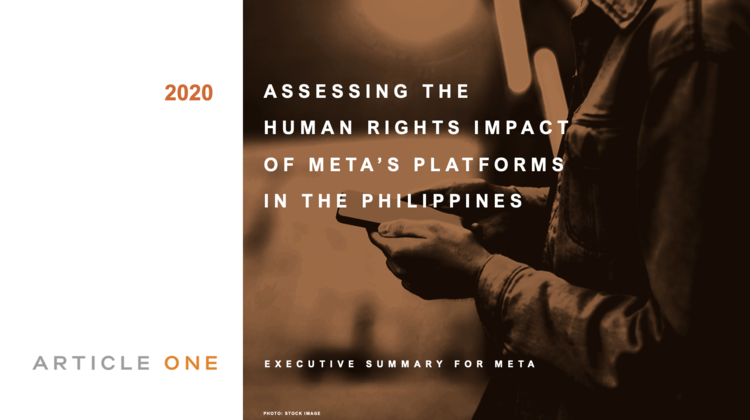
CHALLENGE: META PARTNERED WITH ARTICLE ONE TO SURFACE AND MITIGATE RISKS RELATED TO ITS PLATFORMS IN THE PHILIPPINES
Article One’s can-do attitude to pioneer new methods in the middle of the pandemic was invaluable. Article One delivered this hard, innovative project with focus, commitment, and agility.
— Miranda Sissons, Director of Human Rights, Meta
APPROACH
Article One’s country-level human rights impact assessment methodology was informed by guidance from the UNGPs and the GNI Principles as well as Article One’s award-winning methodology for, and experience in, conducting human rights impact assessments around the world.
The COVID-19 pandemic posed new methodological challenges. Given risks to both rights holders and researchers, it was determined that in-person field engagement was not appropriate. As such, Article One conducted engagements virtually and partnered with Nielsen to conduct a survey of 2000 Facebook users in the Philippines, including 1500 urban users and 500 rural users. Among these, we included surveys with 75 journalists living and working in the Philippines. In surveying users, we were able to expand our direct engagement with rights holders which in turn surfaced salient issues not explicitly raised by civil society and other legitimate representatives. This methodological tool, still rare in the business and human rights space, proved a valuable addition to traditional methodologies and should be incorporated in future HRIAs as appropriate.
Based on the insights from desk research, direct engagements and survey results, Article One applied the approach outlined in the UNGPs to determine the saliency of and Meta’s relationship to the impacts that surfaced during the assessment. To determine the relative priority of salient human rights impacts, Article One assessed the scale, scope, and remediability of impacts.
Article One then developed a series of recommendations to support Meta in maximizing its positive human rights impacts and mitigating its adverse impacts in both countries.
FINDINGS
We recognize and commend Meta for making the findings of this human rights assessment public. If you would like to review the findings and recommendations from the country-level assessment, please download the executive summary below.
IMPACT
Meta engaged robustly in the HRIA process and implemented the majority of recommendations we proposed. While there is always more that can be done, Meta has made significant strides in addressing the impacts of its products and respecting the rights of users and others impacted in the Philippines. Specific changes Meta made in response to our assessment include:
- Taking additional steps to combat misinformation and disinformation, including strengthening its approach to addressing coordinated social harms by authentic users; expanding the Facebook Ad Library to the Philippines; expanding it’s misinformation and real-world harm policy to include further categories of health misinformation; and increasing investment in digital literacy.
- Proactively addressing online harassment, including expanding tools to enable and empower users to take control of their security and privacy; updating its Community Standards to prevent calls for coordinating harassment; launching a mass harassment/anti-brigading policy; and adopting a “public interest” consideration in place of a “public figures” consideration.
- Addressing sexual exploitation and trafficking including using Meta’s leverage to push for online child safety bills in the Philippines; evolving default privacy and safety settings for minors; and launching proactive detection tools to reduce discoverability of exploitative content.
For a full list of actions taken, please see Meta’s response to our assessment.
